|
Words & photos © Tim Keller
Sketch Fiction
Card Tricks
The way my mom tells it, Uncle Matt was always a card short of a full deck but made up for it with creativity. He could fill a gray afternoon with jubilation. More often than not he had friends around. Alone wasn't his strong suit.
He could write you a song on his guitar or draw your portrait on his napkin. If you were a girl, he'd add his phone number to the napkin. In the picture I have, beneath the straw cowboy hat his lip is split but he's got a mischievous smile, like you know what he did but you both know he'll never get caught.
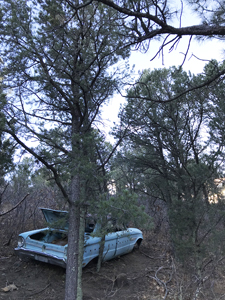
Of course it was alcohol that did him in. He'd been in town drinking with friends. Grandpa had taught him how to drive on the north forty but from then on it was these roads out here, treacherous even when you're sober. Mom says these roads didn't phase him, that he'd drive his truck through the canyon like Mario Andretti was breathing on his rear bumper. Matt's charms led him to believe he led a charmed life. People liked him. Of course no amount of charm is going to straighten a road. Mom says each can of beer adds three miles per hour to your speed around the curves.
His truck was on jack stands that night, in the garage for one fix or another, but Grandma let him drive her blue Ford Falcon Futura to town. It was probably a football game on TV, his friends gathered on a Sunday in December. It wasn't a girl or she'd have been with him. Good thing.
They found him ten yards down the hill from the car. A seat belt would have saved him but he led a charmed life. He would have smiled. Seat belts? We don't need no stinkin' seat belts. And he drove off, bat out of hell. Call him the joker, or the jack of hearts. Mom says he was a card.
If You Sit Still Long Enough
The best thing about winter is that the flies are mostly gone. You keep your windows closed, and the flies have flown to wherever flies spend the winter. Maybe New Zealand.
The land goes dormant. This year's harvest dies. Have you ever seen a year-old weed? No, you haven't. Some things you just run out of time and can't get them done. Weeds.
Regardless, the earth keeps flying around the sun. The dead cornstalks out there remind me every day that winter's coming, and I didn't get the job done. I tried.
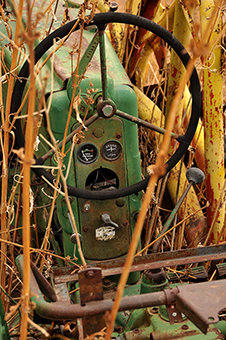
It was Roger's job but we were a team. With him gone, I've tried to do it myself. The door's coming apart and letting the cold inside. The wind is flapping at a panel on the shed. The tub drain is slowed up. There'll be more.
In the morning I open my eyes once just to sense the day. Is the sun out. Then I close them back up to consider. What am I going to do today. I try to line it up and feel good about it.
That goes well and I'm up. Or it doesn't and I adjust the plan. Autumn is a time of adjustments. The darkness comes so early. The time is so short. You can't get everything done.
Come May I'll be dancing a jig and planting corn and the days will lengthen to meet my stride. I'll throw off my sweater and wear a hat to shield the sun from my eyes.
You've got to be an optimist to believe in May.
Coming Later
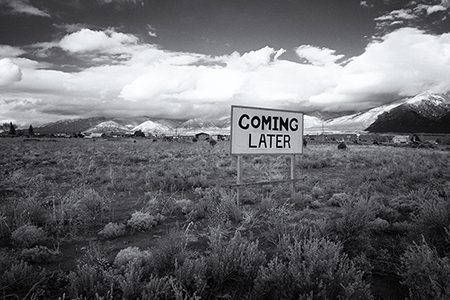
In the morning, Andy walked down the drive from his grandparents' two-bedroom house on the big ranch and snagged a ride within minutes, Ortega Highway good for that. By early afternoon he and his red Kelty backpack had progressed west to San Juan Capistrano, south on the 5 to San Diego, and east on the 8 all the way to El Centro where it was hot, already into the 90s, even now in the early spring.
He was new to hitchhiking and yet to learn that freeway onramps were not his thing. He'd once tried hitchhiking home five miles from junior high school just to be cool but three things happened that turned him, until now, from hitchhiking: his school bus passed him, his friends beating him home; it rained; and his mother happened to drive by and picked him up in the rain, sending him to his room when they got home until his father could deal with him after work.
At two o'clock, Andy propped his backpack on its side and started using it as a backrest. He'd been at the eastbound onramp along El Centro's east side for thirty minutes and standing with his thumb out didn't seem any more productive than sitting with his thumb out. The idea was to make it all the way to northern New Mexico where young people from all over the country had been migrating and gathering in communes and the like. Working on the ranch and camping at Joshua Tree had taught him to love the desert. New Mexico might be just right.
By three, this was getting old. It had taken him only seven rides and five hours to cross the entire congested bottom of California to El Centro. Now that he'd reached the edge, nobody would pick him up. In fact, not many cars were heading east. Nothing but desert all the way to Phoenix. Either way, whether it was something about Andy or something about the land, he was still there at four-thirty, now back to standing, three hours at the same spot. A hundred cars and trucks had accelerated up the onramp, every one of them passing him by.
This was when Andy learned to "go with the flow," later embracing a Rilke quote, "Life is right in any case." Almost despondent, he walked under the interstate and across the street to the westbound onramp, not sure what he would do but sticking out his thumb to give it a try. The first car picked him up. He made it back to his grandparents' before they'd even gone to bed that night, tail tucked between his legs but secretly damned happy to be there.
He'd get to northern New Mexico but he was coming later. By then he'd be driving his own car.
Swing
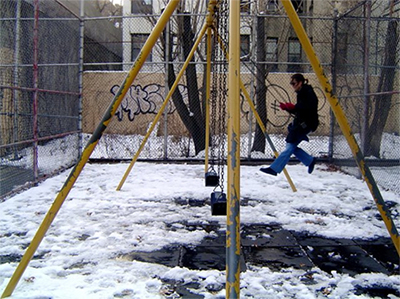
The coffee started it again. She's still not doing it right. No way to start a morning but that's the way they've been starting, whether it's the window shades or the heater or the coffee. It's her apartment but after six months it might as well be his. Too small for the two of them, or at least too small for her with him. She needs her space back. What to do.
It seems to work at night. Maybe it was last night's dinner at L'Artusi, or the wine, but she thought she could make it work. They held hands on the walk home and he held the gate for her. Maybe it's just the apartment, too small for two people.
But the coffee and the heater and the window shades, they'd be the same in a bigger place but even more of them. She thought it'd be better to have a guy she didn't need extra space to get away from. For now though she just needed a time out. It's only three blocks to the school and the walk will do her good. There's nothing like a swing for a good time out.
Boys
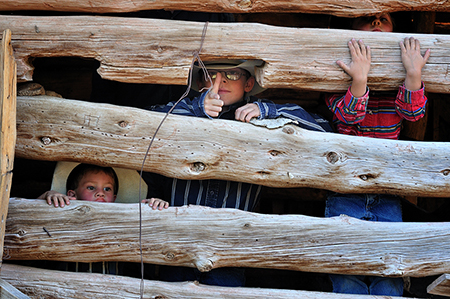
You can be Sundance and I'm Butch. The cows can be the posse. They look this way once in a while but they won't see us. Lay low.
How do I know how long we have to stay in here. If you quit you'll get shot as soon as you step outside.
Dad doesn't care. He's busy and anyway they're not looking for him so he won't get shot. You only get shot if you play.
This is better than mucking around the stalls. The posse spotted us, let's shoot our way out. Don't step in the cow shit.
Dad started the truck. Let's go. He promised I could drive across the big pasture today. Leave the guns here for tomorrow.
Charlie's Hat
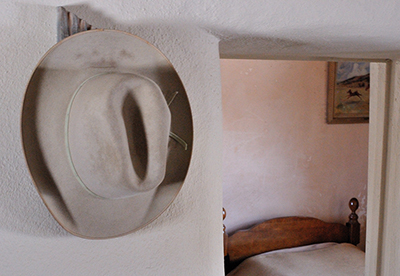
A hat generation is shorter than a human generation. Charlie couldn't tell you how many stockman hats he's had over the years but, at 78, each one has been the same stockman style and size, 7 1/4, and always overlapped some months with the one that came before it. Why change.
The house has remained familiar as well. His family moved in when he was three. His kids live nearby with their own families--Charlie's grandkids--and Charlie lives alone in the family home. It's been home for 75 years. In the kitchen, he cooks and washes dishes with water from the hydrant just outside the door, the way his dad set it up in 1940. Why change.
He helped his kids build their houses. Theirs aren't the only ones that have sprung up here on the dry prairie south of town. Hundreds of houses are dotted across the low hills and along the twisting arroyos, making it ever more difficult for Charlie to move his shrinking herd of cows from place to place to graze.
Herd is too grand a word anymore for Charlie's cows. A few dozen cow-calf pairs is a big year for him now and, as droughts have become the norm, he rarely keeps so many. Buy 'em in the spring, ship 'em in the fall, and live on the profit from the weight they gain while you have 'em. Keep some mother cows over the winter to calve next spring.
Bigger outfits trade for a new pickup every three years or so, depending on the rain. Charlie's still driving his 1982 four-wheel-drive Chevy pickup. The cows know the truck from a distance when they see him coming along the winding two-track. He keeps three horses for cattle work but mostly the truck is all he needs.
A truck should last longer than a hat made of felt, subjected to so much sweat and dirt and weather. Making a hat last three years is, for Charlie, like making a truck last forty years. He takes good care of it. You care for your things as best you can. When their time is finally up, you reluctantly replace them. When they've suited you and worked well, you replace them with more of the same.
At the end of the day, you look back and appreciate the things that worked. You've made your bed and now you sleep in it. In the morning you choose the proven and the worn. They work. You work. Why change.
Lawn-Boy
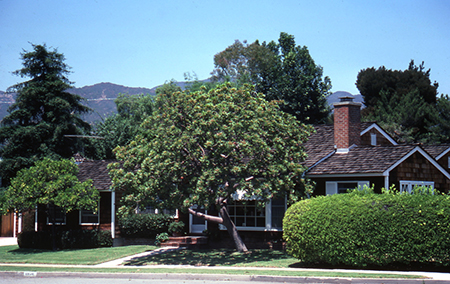
If I do them in the same afternoon, I always mow the lawn first so it's not wet from washing the car. Actually, there are two lawns, front and back, and two cars, but I don't think I've ever managed to do all that in one day. That's why God gave weekends two days.
My dad backs the cars out of the garage for me, one at a time for the wash. My mom's gray 1964 Ford Falcon station wagon, and Dad's beige 1966 VW bug, about half the size of the Ford but I get the same three dollars allowance for washing it. I can do them every weekend if I need it, and mostly I do. I'm 15.
Dad had British sports cars when I was little. A Rover, then a Jaguar XK-120, then a Triumph TR-2. Now that his sons are teenagers, he has to be more sensible. Volkswagen bug. It's quick to wash but first I mow the front lawn. Today I'm rushing because I want to skateboard to school before it's too late. I gas up the mower and roll it out front. It takes three pulls, two coughs, and comes to life with an ear-splitting roar. There are two controls that extend to the handles from the body of the mower. I set the blades to full speed, the drive to mid-speed, and I make my first straight line along the curb, mowing the parkway before working up to the more irregular lawn where I have to curve around trees.
The more I mow, the faster I go. I increase the speed until it's maxed out and it's all I can do to keep up with it. At this rate I'll have time to spare when I finish. I pull the throttle lever and crank a turn at the hedge then quick push the throttle in a careen back across to the driveway. Except as I approach the driveway, there's my dad coming around from the back gate. He tells me to slow down. I can't do a good job like that. Slow down. He goes back through the back gate and into the house.
My spiteful streak emerges. I turn the speed control all the way down. Grandma could mow the yard at this speed. I could almost point it down the row and go wait for it to arrive at the other end. I'll show him. I hardly have to dethrottle to turn 180 degrees at the hedge. The machine and I creep back toward the driveway. My steps are the short shuffle of a 90-year-old man in slippers behind his hospital walker. As we slowly cross the walkway my dad catches my eye by opening the den window. I have to shut down the engine to hear him. He says I don't have to go that slow.
And I can't control myself. I break into a big grin, a big stupid grin, because I was running the mower stupidly slow, Grandma slow, out of pure spite, and I don't know what to do with Dad's reasonableness except grin and bear it. I want to go fast. I want to do it my own way. I don't want to mow at a reasonable speed. If I can't race unreasonably fast, I'll trundle along unreasonably slow. I'll show him.
Except, at the window, he's my father, and suddenly it returns to me how much I want to be like him. He's being perfectly reasonable, and I'm being perfectly stupid. It's hard to mow at mid-speed again, but I slog it out and finish. I feel ashamed, a lingering child today rather than the mature young man I want my dad to have for a son.
I wash and dry his bug, roll the hose and put away the bucket and towels. There's only an hour left before dinner. I pump my skateboard hard and fast all the way to school, where I have time for just two quick runs down the long steep hill. It's enough. By the time I get home the driveway is dry and the front lawn looks golf-course clean. I wash up and take my place at the table. I sit next to my dad.
Depot
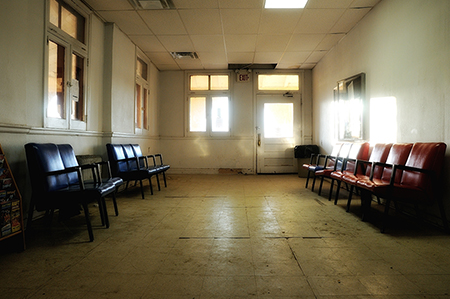
Unmistakably a slam, the final closing of the door felt triumphant. There was nothing new about the argument and she was right, there had been no change. When suddenly I pronounced that I was headed out, it wasn't clear whether her heaves were grief or relief but my time was short and I packed quickly, leaving some books behind. The westbound train came through Hutch at three and I could easily make that, putting me in New Mexico for the sunrise of a new day.
Her final touch of kindness on the way out was no gift, only making it harder for both of us, but that's who she is. She's not going to throw something, and the yelling was over. No, now she asked me to let her know where I landed. Someday I'll probably do that but for now it's all forward motion, onward to the new, casting out the old. Motion is freedom.
The conductor said the sun will help melt the ice and the local crew will have the train back on its way in no time. It's almost as cold inside the depot as out but it's something to do, a piece of the west, the cost of exploration. I've no idea where I'm going. If my destiny was manifest I wouldn't be here this morning. Albuquerque will be warmer and more hospitable and my cousin always has a bed for me but it's no place to stay. I'll get my bearings and move on. Motion is freedom. The depot is cold.
Brothers in Arms
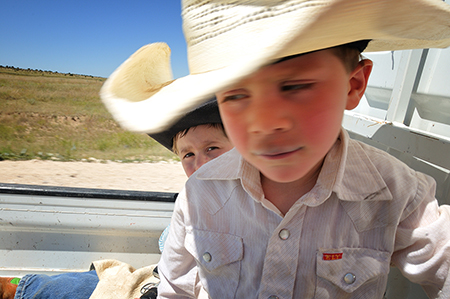
The kid won't stop squirreling around, thought Ben. How'd I get saddled with a brother that's such a goddam barrel of idiot monkeys. I'm supposed to do everything right, but him? There's the cowboy way, and there's the idiot cowboy way. From where I ride, he's always trouble. Always. I'd like to slap him around but then Pa slaps me around. Every time. Pa never slaps him around cause he's the kid. No matter how fast he grows out of crap, I'll always be two years ahead of him and it'll never be enough.
Ben just sits there all serious, thought Jared. Always all serious. I wanna slide a racer snake down his shirt just to get a rise out of him. Wrestle or chase each other across the goddam field throwing things this way or that, mix it up. He's a better hand than me but how am I supposed to top that? Every year I live, he's still gonna be two years older. I'm Pa's free spirit, the Department of Fun. Somebody's gotta be in charge of fun around here and it ain't gonna be Ben. I'm in charge of frog gigging and sneaking ice cream. That's my territory. He's humorless. That's what he is, humorless.
Last month Jared sat a colt, Ben recalled, and if I hadn't been there he could of got hurt bad. Pa says that's part of my job, to take good care of Jared and help him grow up right. He got scared on the colt and that's a good sign. Shows he has a little sense anyway. When I got him down he hugged me. Sometimes it's like there's a hobble tied from my ankle to his, like I gotta drag him around or keep him from running off. I swear, you don't keep an eye on him, no telling where he'll end up. Give him five minutes and you'll wish you didn't.
I wanna race, thought Jared. If Ben won't race me, maybe if I jump out of the truck I can cut across the pasture and beat them to the corrals. The two-track curved around to hug the thin treeline along the arroyo before reaching the horse barn and corrals. Jared suddenly threw himself over the rail of the pickup bed and raced across the field, the happiest man in the county, the Department of Fun, his laughter racing out two steps ahead of his little boots.
The Glass
He's done drinking before midnight and gets a little sleep. Even in the best of times he never slept well, though with her he'd stay in bed all night just for her company. There's always lots to think about. There was enough to think about that she left.
The passage of time. The lack of...purpose? direction? point? There's nothing to do about it but think, and drink, and that passes the time, slowly, slowly. The prospects for change are not high, no bright sunshiny day coming around the corner.
The glass is neither half empty nor half full. It's just a glass. He walks two blocks to the club to face each sunrise from deep in shadow, as though daring the first horizontal rays to reach as far as he has gone. Same as the others, it's a new day.
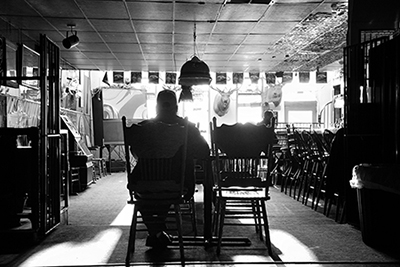
The Money
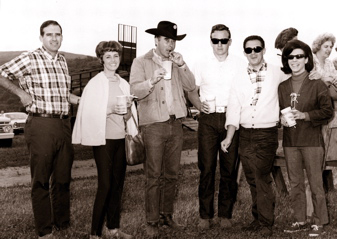
Nah, they're just here to dabble with cowboys, play cowboy once a year. A couple of them even get on horses for a picture, though it's better to do that before they get too far along in their drinks. They come down from Orange County, some of them from LA, to get a little dirt on their jeans. Last year one of them had his picture taken holding the iron over a bawling calf's flank, big cowboy. Then he put the iron back on the fire, freeing up his hands so he could get his cigarette and beer back from his wife. You best just keep working, kid, and ignore the money if you want to stick. Come Monday morning, it's all they'll be talking about at the office, and you'll be out in the muck at the cow camp same as last Monday. Don't you just love it? I know you do.
(Note: This is the 1967 roundup at Rancho Mission Viego out the Elsinore Highway east of San Juan Capistrano, California. Also known then as the O'Neill Ranch, with 53,000 acres, it was my first job; I was 16. And no, the kid in the sketch isn't me: I was building fences and the like, general labor, not mucking with cattle. My ride was not a horse but a Ford pickup, and I usually rode shotgun so it was me that had to get out to open and close every gate.)
Coyote
The rain hadn't made the drive any easier. Four hundred miles, that's a thing but not a hard thing. They'd done it before, no problem. Jerry always drove, and Ray had long ago stopped cracking the passenger window because it irritated Jerry. They got along. Except today, well, maybe it was the rain.
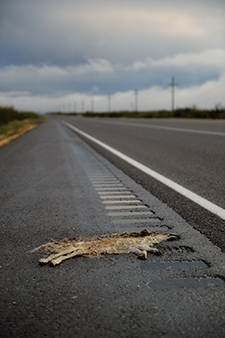
You just haven't done well with women, Jerry offered. Well with quantity, he clarified, but not well with quality. The keepers walk right over you and they're the ones that stick for years.
Next one I'll run her by you first, Ray said. What difference does it make to you. It's got nothing to do with you.
We'd see you more often if we liked your women. And we like seeing you, despite yourself.
The turnoff to 26 is coming up on the right, Ray said.
Rhonda's got you on a leash. It's a long leash, I'll grant you, but she keeps you circling, Jerry said. She's a neighbor with benefits.
I'm not a dog, Jerry. I'm a coyote. I make my own moves and go where I want. I'm here with you aren't I. Rhonda's cool enough. And I'm a free man. I'm a coyote.
You used to be a wolf so I'd say you're downsizing.
Jerry veered right onto 26 and the rain picked up again. Ray cracked his window. They weren't far now.
The Green Apple
The camper sat there for several cat lifetimes. One cat lifetime ago, Saunders moved into it. He painted it green to mark the occasion, figured if he was going to live in a shell, at least it'd be spruced up and lively. A couple days later, weeding the garden, he named the camper The Green Apple. No one else ever knew this. It's not like he had a lot of friends anymore, or told anyone at the store that his camper was named The Green Apple. He told the cat, and after that one died and he took in Rosie, he told her, but cats don't tell.
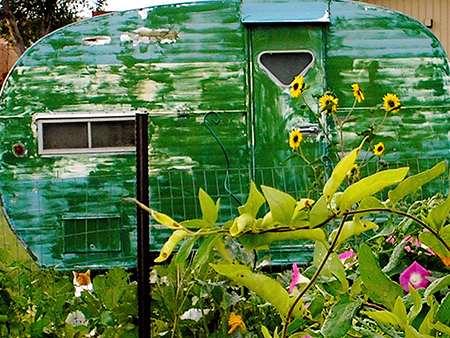
Like the others, Rosie started wild, a feral cat from under the big sheds on the adjoining property. Like the others, she grew tame under his influence. He had a place under the table where he kept bowls with water and cat food. Rosie took to sleeping with Saunders at night, usually nuzzled against his legs for warmth. Most nights she came in on her own accord, mewing at the door. Saunders listened for her each night and worried when she was late. Sometimes she wouldn't come and he'd fall asleep worried. Around midnight she'd show up and the small mewing outside his window was enough to wake him because he was waiting for her. As his health declined, Saunders wished some days that Rosie would come around more in midday to keep him company.
One September night Rosie came home to The Green Apple but Saunders didn't open the door. She scratched at the door. She waited. In the morning she was still waiting. She looked up at the window where they slept. She waited.
Arugula
The chair scrapped along the pine floor as she pulled it out to offer it. The napkin rings and red carnations had been a tough call, maybe too much. He'd taken his hat off and left it at the door. That got her attention, rancher boy, impressive that he didn't leave the hat on. He ran his fingers through his hat hair, roughed it up. Faint smell of wind, grass, cows. Awkward inside, in town, at lunchtime.Two Saturdays at the farmers market, two flirtations, and now a town lunch on a Tuesday of all things.
She had her hair tied up with a red ribbon, matching the flowers. She set the two salads next to the iced tea she'd sunbrewed in the second-floor window. He chose the ranch dressing, she the vinaigrette. This is a different kind of lettuce, he said. Kinda bitter. It's arugula, she said. Like Obama, huh? He didn't know arugula. She said it's lettuce. She got it at the farmers market, remember. A car horn below the window helped change the subject.
Yes, she said, she liked living downtown. He couldn't do it, he said. He had to park his truck two blocks away and walk. She'd heard his boots on the stairs. Maybe she'd come out and see his place sometime. How would her Prius do on the dirt roads, she asked. Depends on the season, he said, but yeah, that could be an issue. Maybe I could pick you up.
She brought the sandwiches and he was relieved to see bacon. He thought there might be more arugula. Good old-fashioned BLTs except the bread was fancy. The lettuce was lettuce, not arugula, better. He asked for sugar for his tea. How long had she been living here, he asked. She moved from Houston in September, made it through her first winter. She was more a summer girl, but being downtown made it easier. She was glad for the summer.
He was, too. It was his busy season but less mucky and he made a lot more money. His truck got new tires last week. He didn't get to town more than a couple times a week, usually midday or night. Early morning and late afternoons were the busy times for work, when he had to be on the ranch. She was more flexible, she said, working out of her home office, with a window looking to the mountains in the north. Sometimes she worked all night. Sometimes she took the afternoon off to go to the museum.
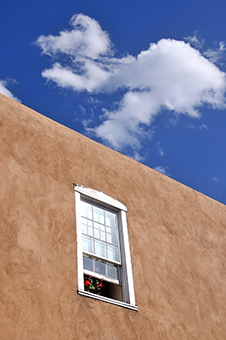
She brought a plate of cookies for dessert. I made them this morning, she said. No arugula in them, he wondered. She laughed. Finally. No, walnuts and chocolate chips. Old fashioned, he said. I'm old fashioned enough, she said. Like the red ribbon in your hair, he said. She smiled. What was the rest of his day like, she asked. I've got to get my buddy and two horses, he said. We're moving some cows from one pasture to another and it's a ways. We'll be lucky to finish and drive home before dark. In fact, I need to get a move on, don't I.
She enjoyed the sound of his boots going down the wood stairs. She stacked the plates in the kitchen and set the red carnations in the open window. The street sounds below grounded her. She wondered if that was his truck going by. It turned right, to the south. She walked to the mirror to look at the red ribbon in her hair. It looked just right.
|